'Find a name that changes the words honor killing and hopefully it includes the word murder.'
'If you use the words, you are trying to justify the murders.'
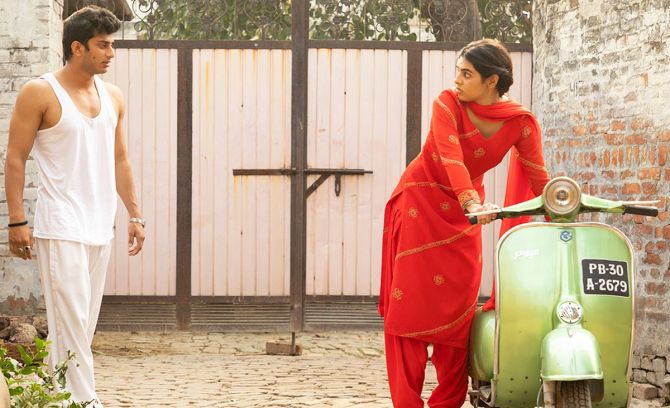
Tarsem Singh Dhandwar came to cinema through advertising. The film-maker is best known for his commercials for Nike, and music videos, especially the stunning depiction of R.E.M.'s song Losing My Religion on the screen.
Over the years he has also directed visually lush, hallucinatory films including The Cell (with Jennifer Lopez), The Fall and Mirror Mirror, the retelling of the Snow White and the Seven Dwarfs story with Julia Roberts and Lily Collins.
Tarsem Singh has now directed his first feature film with a story set in Punjab and among the Indian immigrant community. Dear Jassi, premiered at the Toronto International Film Festival and recently played at the Red Sea International Film Festival in Jeddah.
Dear Jassi is a true story about Jassi, a young Sikh girl from Vancouver, who fell in love with Mithu, a kabbadi player in Punjab.
Their beautiful love story ended when the girl's mother took shocking steps to separate the two.
As with other films by Tarsem Singh, Dear Jassi is beautifully shot, and captures the colors and vibrancy of a village in Punjab.
After a long search for actors, Tarsem Singh cast a real kabbadi player Yugam Sood from Mandi Ahmedgarh in Punjab for the role of Mithu and Pavia Sidhu, who is based in Vancouver, as Jassi.
Senior Rediff.com Contributor Aseem Chhabra spoke to Tarsem Singh, Pavia Sidhu and Yugam Sood about the making of Dear Jassi at the Red Sea festival.
Tarsem, most of your work has been in Europe and in America, including the commercials and music videos. How did you capture the authenticity of Punjab and immigrant life in Canada?
Tarsem: The reason I went after the story was because the area where the event happened in Punjab is very close to where I was born. And before I went to the US, I stayed with some cousins in Canada and I did some pruning, cutting mushrooms.
So I knew that world. I knew what cow dung smells like. I said this is so familiar to me that if I made the film it will look like someone has observed these two worlds, but it's not going to be shown like a documentary.
The challenge was that no actors would be able to carry this story unless they came from the authentic backgrounds.
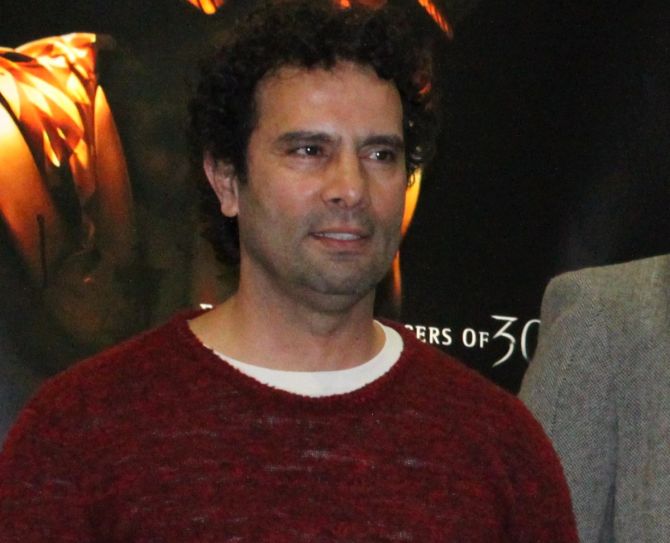
Yugam is a real kabbadi player.
Tarsem: Yes, he's a sports person, but before I cast him I had turned down every actor they gave me. And then for Jassi I had 24 hours to cast before the film was gonna fall apart. And everybody I saw was wrong. So I just got on the phone and started calling bhangra groups in Canada.
Pavia, did you apply for the audition?
Pavia: I made a tape. But I am a dancer and multiple people approached me for this role.
I ended up on a call with Tarsem. After that I had a long Zoom call. It was so long, I remember thinking I needed to sleep. It was just draining.
I cried so much as an actor. And then I was flying to India. I really did my research once I got there.
Yugam, what was your casting experience like?
Yugam: One of my friends sent me the casting call information. I didn't know what casting calls were.
I didn't know whether I was supposed to sing, dance or show my muscles.
The auditions were held in Ludhiana, 30 kms from my home. It was the last day of the auditions.
I was given a four-page script to memorise lines. Main dar gaya script dekh kar. I said I had never studied so much in school as I will have to memorise the script.
I returned to the script to them saying I couldn't do it. But they insisted I do something at least, since I had come this far. It took me and hour and half to learn the lines.
Then they placed two cameras, one right in front of my face. I was so nervous that I started sweating a lot. So they calmed me down by talking to me and then they shot the audition tape. And I believe they liked the tape.
One of the casting guy said I looked like a senior actor. Where had I learned acting? And I told him, I am just a sportsman.
Still I thought I would get a chota-mota role. I didn't realize that I would play the lead.
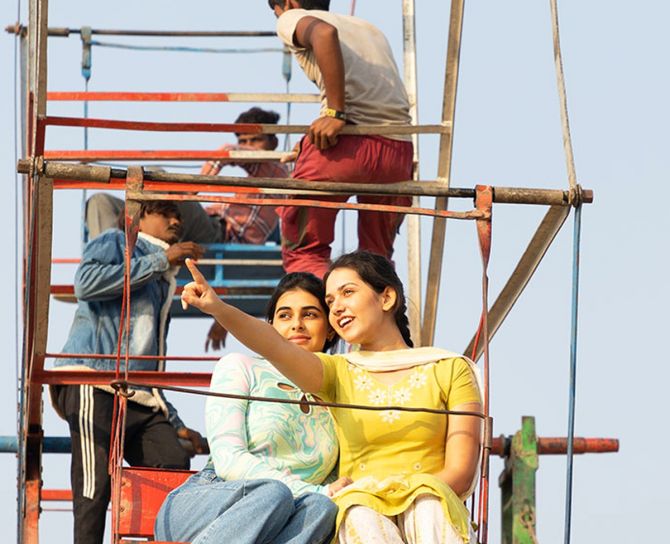
Tarsem, how did you direct these two?
Tarsem: I didn't want any lines to be written for the film, The screenplay was a structure. So I said these people are the real ones.
I am going to tell them a thing or two. And they are going to talk and we will film it. We are not going to rehearse. We are just going to tell them what the situation is.
I showed them the places a week before. And when we began to shoot, I would tell them what the scene was about. So everything in the film appears real.
Pavia and Yugam you both were so charming in the film and there was this freshness. You had not acted before, so how did you bring that innocence on the screen? Tell me how Tarsem worked with you two?
Pavia: Like he said, he just let us be. He was really like a fly on the wall.
In terms of innocence, it's not something I had to bring. I just had to make sure I understood Jassi well.
She did have a sense of innocence. So I had to find it and put her in a beautiful light.
I love the chemistry between the two of you. Do you remember the first time you met?
Yugam: When I first met her, I was very nervous. I don't speak that good English and I thought she has come from outside. I hope I don't say anything wrong.
I found her very beautiful. I don't think I had to show anything. I had love inside me and that is all I could show and people watching the film can sense it.
Pavia: I was born in India, but I had never visited India. I landed after a 15 hour flight and I didn't know anything.
I was taken to the set and Tarsem introduced us and said this is your lead actor.
We just kind of went from there. But he's a lovely human being. He's very honest emotionally. And it's very rare to meet people like him.
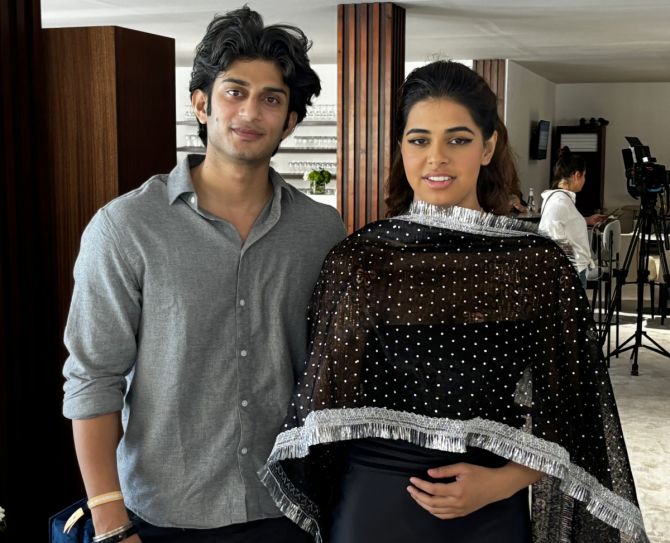
Tarsem, in making this film what were you trying to say about Punjab? Because Punjab has become very complicated.
Tarsem: It was always complicated. Punjab is like Romania. All the invasions towards the Khyber Pass funneled through that area.
Punjab saw brain drain and now drug drain. What I show in the film is a recent problem, but that area has never been calm.
Yes, but the honor killing issue...
Tarsem: This is something I am trying to tell all journalists. You have a year and after a year I am gonna call every journalist I know.
Find a name that changes the words honor killing and hopefully it includes the word murder.
There is nothing honorable about this killing. If you use the words, you are trying to justify the murders.
No, there is no justification in these killings. It can be economic, social or religious. If you are going to do that, it is not honorable.
Yes, you are right. I love the way you capture the caste issue in a subtle scene where Mithu is offered tea in the metal glass.
Tarsem: You and only one more Indian journalist I have spoken to here get that. I have taken the film to many places.
Very few understand the nuance. But I knew Indians would understand in two seconds.
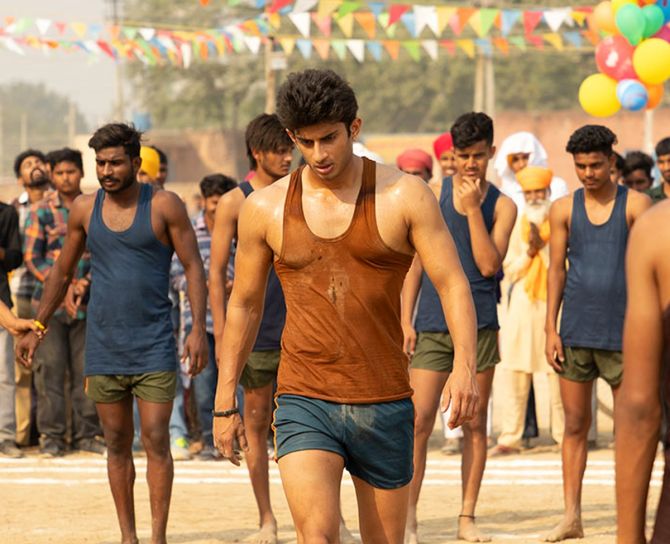
You didn't want to show it in a bigger way?
Tarsem: That's the thing. The story didn't evolve because the guy was from a different caste.
It's because he was from a different social stature. Everybody thought this was a caste issue, but I said it's not.
They were both from the same village. It's more of an economic issue.
How long have you known the story?
Tarsem: Twenty years ago when I first heard about the telephone call the mother in Canada made to the people who were caught (spoiler alert, but it's a key moment in the film) and then I put it on the side, thinking I will address it when I am ready to make the film.
I just said my god, if that is true, then either you make that person a one-dimensional villain, or you delve into the complexity of the situation, and this belief that they are living in a joint family, and if one girl does something wrong from the family's point of view, then the other eight won't get married.
So what does the mother do in that situation? Why does she come up with the most horrendous outcome imaginable?
Yugam and Pavia, did you guys know the story and how did it affect you?
Yugam: I live in Punjab, but I am far removed from this world. I am 23 years old and I have spent the last 11-12 years of my life on playgrounds. Now a new life has emerged in the film industry.
Pavia, in Canada it was a very famous case.
Pavia: I think similarly, I didn't know the story, which is so unfortunate because it's such an important story in our culture. But once I did know it affected me deeply.
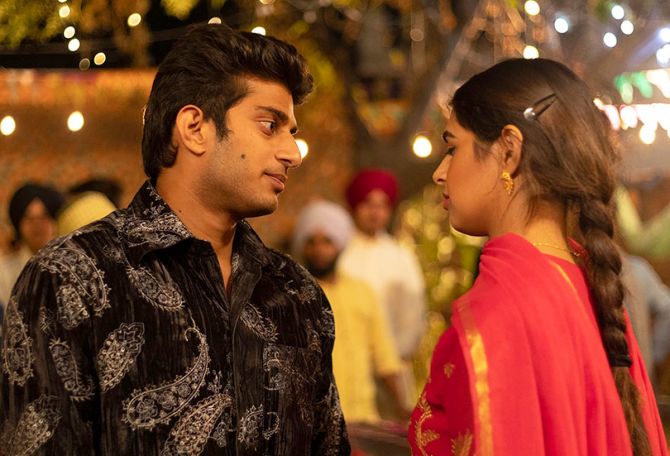
Tarsem, you are a very patient film-maker. Your films take a very long time. Mirror Mirror was made in 2012 and The Fall came out six years before that.
Tarsem: Well, The Fall took about 26 years in making. I came across the idea for Dear Jassi a while back.
I would have made it then, but it happened when it happened. And it happened within a few months and it was edited very quickly.
I know it looks like a long time, but I also have my daily job. I am ready to do a movie when the right movie comes along.
Have you made any more music videos since Sweet Lullaby?
Tarsem: I made one with Lady Gaga a few years ago. It's called 911.
I still remember when I first saw you on television in 1991. You were on stage with Michael Stipe to receive the MTV Music Video Award for Losing My Religion. You were wearing a pagri and I remember thinking who is this man?
The funny thing is, I had never worn a pug in my life except at my sister's wedding.
At one point I used to work as a busboy in a restaurant in Los Angeles. So I went back to the restaurant and the chef put the pug on my head.
The pug was five times bigger than my head. It just turned into this thing. It was like bizarre.
Pavia and Yugam, now that the acting bug had caught up with you both what is your future?
Pavia: I know acting has worked out for me. But I also enjoy being able to take part in humanitarian work or be able to make a difference. We will see where it goes.
Yugam: I am sitting here and everything I have learned is because of sports. So whether I act or not, until my last breath, I am going to give my best to sports.
Feature Presentation: Rajesh Alva/Rediff.com


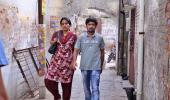






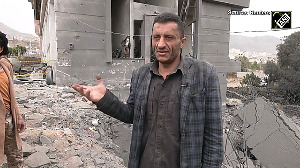
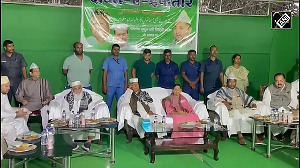
 © 2025
© 2025